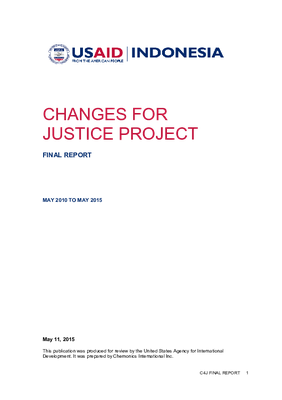Changes for Justice Project: Final Report

This is the final report for the Changes for Justice Project (C4J), a 5-year USAID contract implemented by Chemonics in Indonesia from 2010 to 2015 that had significant success building the capacity of the justice system to address environmental crime.
Key Points in Document:
- This is the final report for the Changes for Justice project (C4J), a 5-year USAID contract implemented by Chemonics in Indonesia from 2010 to 2015.
- C4J was designed to sustain earlier judicial reforms, compare the knowledge and experiences of each, and deepen the reforms by improving management and increasing transparency and accountability within Indonesia’s judicial and prosecutorial systems. Key activities included institutional reforms in human resources, budget and financial management, case management, information technology, education and training programs, and public services. Technical activities included development and launching of prosecution guidelines, a new prosecutorial code of conduct, a new certification program for judges on juvenile cases, and an integrated justice sector training program on combatting threats to biodiversity.
- The Final Report contains implementation actions, results, and lessons learned from the project, including a section on a pilot biodiversity program, which focused on land conversion, illegal logging, wildlife trafficking, and wildlife poaching. This aspect of the project aimed to strengthen the participation of local populations in the legal process, strengthen the capacity of local district prosecutors’ offices through training on environmental crimes, and strengthen the capacity of local district courts on managing cases related to environmental crimes.
- The biodiversity work found that in order to counter threats to the environment through the public and the media, a country must have intensive public education, improved access to the courts, intensive media engagement, and coordination between the public and media. Additionally, combatting environmental crimes requires effective, constant coordination among judges, prosecutors, police, civil investigators, military, and port authorities.
Citation: Chemonics. Changes for Justice Project: Final Report. Washington, DC; 2015.

